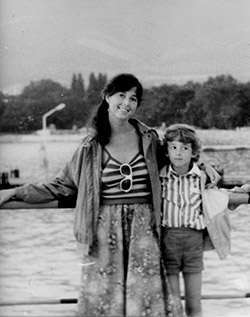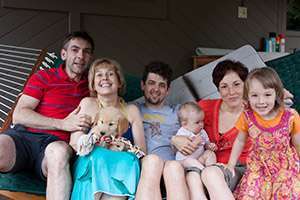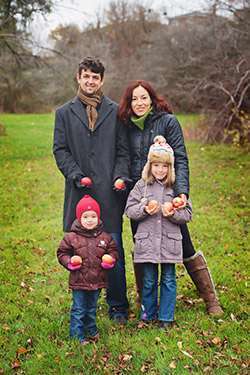
Sergei as a child with his mom, Elena, in Russia.
I’m not a biologist. I’m a computer guy. Yet here I am, in Heidelberg, Germany, pursuing my PhD in bioinformatics with a focus on cancer genomics. Just a few years ago, I wouldn’t have dreamt of leaving my successful software development career and life in Toronto.
But everything changed when my mom got sick.
I had to join the fight against the disease that she had devoted her professional life to, and that so unexpectedly and tragically took her life.
My mom was born and raised in Siberia, Russia, and came from a family of physicians. She wasn’t pressured to become a doctor, too – but she truly felt it was her calling. No one was surprised when she enrolled in medical school and pursued a career as an oncologist specializing in leukemia.
We moved from Siberia to Moscow when I was around 10 years old. This was in the late-1980s, and times were very difficult in Russia. I remember waiting in line for hours with thousands of other people, just to get basic groceries and toiletries! And even as a medical doctor working at the top hematology clinic in Moscow, my mom was earning pennies.
Due to the extremely poor living conditions and political uncertainty of early-‘90s Russia, my parents and I immigrated to Toronto. Our immigration serves as a prime example of my mom’s selflessness – her medical degree from Russia was not recognized in Canada, so she could no longer treat patients, yet she made this move to give me a better future.
Several years later, after my parents’ divorce, my mom decided to return to Moscow so that she could practice medicine again. There, she met my future stepfather, and they decided together to endure the rigorous and highly competitive process necessary to transfer their Russian medical degrees to become licensed oncologists in the States. My stepdad, Dr. Igor Astsaturov, is a specialist in gastrointestinal cancers.

Sergei and his wife and children on a visit with Elena and Igor in Philadelphia.
My mom and stepdad’s training took them to Fox Chase Cancer Center in Philadelphia, and they decided to settle there. At this point, I had built a comfortable life for myself in Toronto – working as a software development manager for a major online company and happily married with two wonderful kids. I remained extremely close with my mom and I had an idyllic vision that my family would spend holidays and entire summers in Philadelphia with my mom and stepdad.
Everything came crashing down when I got the call from Igor that my mom had a “serious medical problem.” He wouldn’t elaborate, so I called my mom immediately and had to coax the diagnosis out of her.
Metastatic pancreatic cancer. I was not a doctor, but I had lost my paternal grandmother, someone I was extremely close with as a child, to this very same disease 15 years earlier. I knew exactly what this diagnosis meant for us.
I wanted to drop everything and physically be there for my mom, but moving to Philadelphia was not feasible for me and my family. Instead, I visited as often as I could. I remain so grateful to my stepdad Igor for being an incredible caregiver for my mom around the clock. And, as a gastrointestinal oncology scientist and clinician himself, my stepdad was able to study and sequence my mom’s pancreatic cancer cells in his lab, in hopes of finding the right treatment options for her through his research. It is of great significance to me to know that even though my mom is gone, her cells continue to live on in Igor’s lab to help science.

A photo of Sergei and his family shortly before they left for their new life in Germany.
After my mom’s diagnosis, gears started turning in my head. I found it hard to be passionate about my software job anymore. I searched for ways to apply the computational skills I already had in the fight against cancer, but the complexity of the field made me realize that I needed to learn a lot about biology in order to truly make a difference.
So I decided to drop my career and dedicate my energy to studying pancreatic cancer.
A perfect opportunity for me arose right in my backyard – the Ontario Institute for Cancer Research was looking for someone to help manage the data that were coming out of their International Cancer Genome Consortium DNA sequencing efforts. It was a chance for me to get my feet wet in the field of bioinformatics, while utilizing the skills I had built from a career in software development. One thing I learned from this experience was that cancer genomics data sets are extremely large and in order to deliver on the promise of personalized genomic medicine (treatments tailored to a patient’s tumor’s genetic changes), biologists and doctors need appropriate software tools that can help make sense of this data deluge. And this was right up my alley.
Today, I’m proud to be at the European Molecular Biology Laboratory (EMBL) in Germany, working and pursuing my PhD at Heidelberg University. I continue to focus on building the software tools necessary to analyze large data sets of cancer and cancer-susceptibility genes using cloud computing. I don’t have illusions of personally curing cancer, but if I can move the field forward – even an inch – it is sure to impact someone diagnosed with pancreatic cancer in the future. Might my work spare a family the heartache and pain that my family endured?
I owe it to my mom, Elena, to my grandmother Ida, and to myself to find out.
Sergei Iakhnin
Senior Technical Officer
European Molecular Biology Laboratory
Note: Please read about the love story between Elena and her husband, here.





